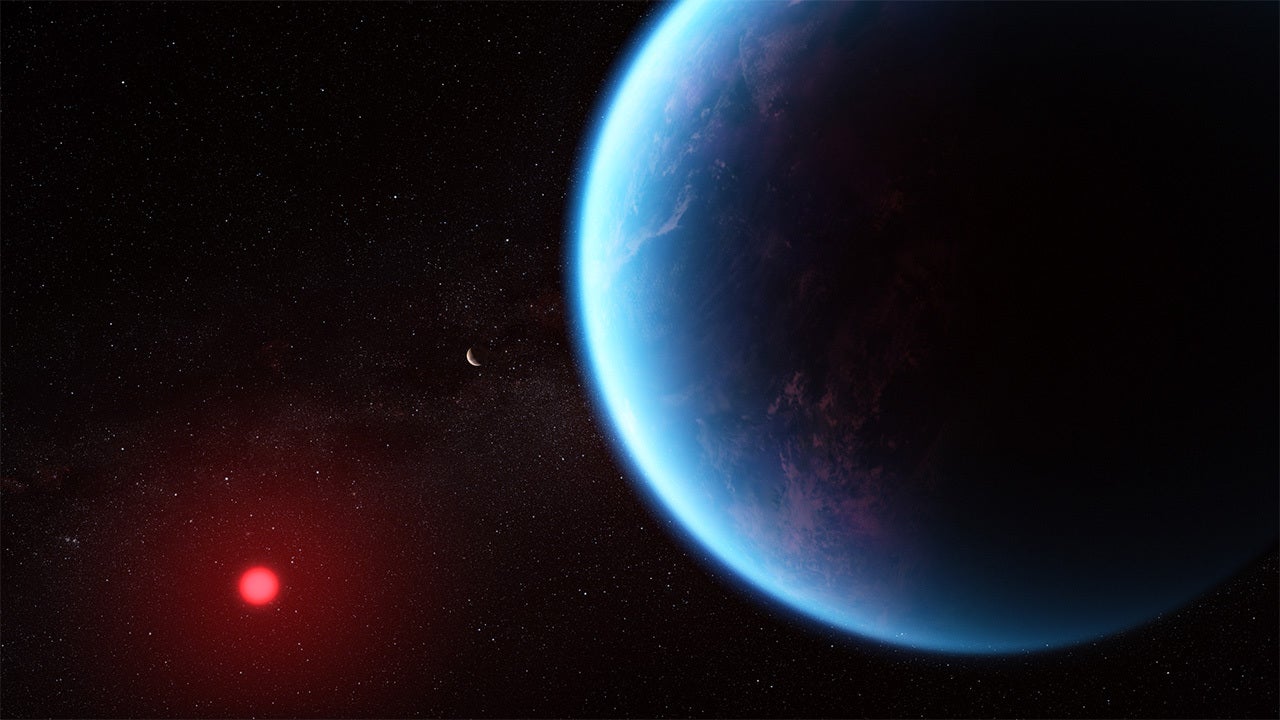<div class="js-react-hydrator" data-component-name="YouTube" data-component-id="5270" data-component-props="{"itemType":"video","index":28,"contentIndexByType":2,"contentListType":"embed","code":"
","type":"video","meta":{"author":"Cambridge University","author_url":"https://www.youtube.com/channel/UCc5vZEM1MLUzCrg_aZIJdeA","cache_age":86400,"description":"Astronomers have detected the most promising signs yet of a possible biosignature outside the solar system, although they remain cautious.\n \nUsing data from the James Webb Space Telescope (JWST), the astronomers, led by Professor Nikku Madhusudhan from the University of Cambridge, have detected the chemical fingerprints of dimethyl sulfide (DMS) and/or dimethyl disulfide (DMDS), in the atmosphere of the exoplanet K2-18b, which orbits its star in the habitable zone.\n \nOn Earth, DMS and DMDS are only produced by life, primarily microbial life such as marine phytoplankton. While an unknown chemical process may be the source of these molecules in K2-18b’s atmosphere, the results are the strongest evidence yet that life may exist on a planet outside our solar system.\n \nThe observations have reached the ‘three-sigma’ level of statistical significance – meaning there is a 0.3% probability that they occurred by chance. To reach the accepted classification for scientific discovery, the observations would have to cross the five-sigma threshold, meaning there would be below a 0.00006% probability they occurred by chance.\n \nThe researchers say between 16 and 24 hours of follow-up observation time with JWST may help them reach the all-important five-sigma significance. While they are not yet claiming a definitive discovery, the researchers that with powerful tools like JWST and future planned telescopes, humanity is taking new steps toward answering that most essential of questions: are we alone?","options":{"_cc_load_policy":{"label":"Closed captions","value":false},"_end":{"label":"End on","placeholder":"ex.: 11, 1m10s","value":""},"_start":{"label":"Start from","placeholder":"ex.: 11, 1m10s","value":""}},"provider_name":"YouTube","thumbnail_height":720,"thumbnail_url":"https://i.ytimg.com/vi/sPRr4DgMTxI/maxresdefault.jpg","thumbnail_width":1280,"title":"Strongest hints yet of biological activity outside the solar system","type":"video","url":"https://www.youtube.com/watch?v=sPRr4DgMTxI","version":"1.0"},"flags":[],"enhancements":{},"fullBleed":false,"options":{"theme":"news","device":"desktop","editionInfo":{"id":"us","name":"U.S.","link":"https://www.huffpost.com","locale":"en_US"},"originalEdition":"us","isMapi":false,"isAmp":false,"isAdsFree":false,"isVideoEntry":false,"isEntry":true,"isMt":false,"entryId":"6800aa1ce4b0e7e6a3f4daba","entryPermalink":"https://www.huffpost.com/entry/life-on-k2-18b_n_6800aa1ce4b0e7e6a3f4daba","entryTagsList":"space,earth,james-webb-space-telescope,university-of-cambridge,@us_huffpost_now","sectionSlug":"science","deptSlug":"impact","sectionRedirectUrl":null,"subcategories":"","isWide":false,"headerOverride":null,"noVideoAds":false,"disableFloat":false,"isNative":false,"commercialVideo":{"provider":"custom","site_and_category":"us.science","package":null},"isHighline":false,"vidibleConfigValues":{"cid":"60afc111dcf87c2cd2f5d8bf","overrides":{"front_page_top_videos":{"desktop":"60b64354b171b7444beaff4d","mobileweb":"60b64354b171b7444beaff4d"},"top_media":{"desktop":"60b8e6bdc5449357a7ada147","mobile":"60b8e701c5449357a7ada2ee","iphone":"60b8e643cdd90620331bb1f6","ipad":"60b8e643cdd90620331bb1f6","androidphone":"60b8e699c5449357a7ada04c","androidtablet":"60b8e699c5449357a7ada04c"},"anthology":{"desktop":"60b8e616cdd90620331bb0ba","mobile":"60b8e671c5449357a7ad9f66","iphone":"60b8e643cdd90620331bb1f6","ipad":"60b8e643cdd90620331bb1f6","androidphone":"60b8e699c5449357a7ada04c","androidtablet":"60b8e699c5449357a7ada04c"},"content":{"desktop":"60b8e616cdd90620331bb0ba","mobile":"60b8e671c5449357a7ad9f66","iphone":"60b8e643cdd90620331bb1f6","ipad":"60b8e643cdd90620331bb1f6","androidphone":"60b8e699c5449357a7ada04c","androidtablet":"60b8e699c5449357a7ada04c"}},"playerUpdates":{"5668ae6ee4b0b5e26955d6a6":"60d2472d9340d7032ad7e443","56aa41bae4b091744c0440d8":"60e869dc7c5f3b17b6741b81","5841b2b5cc52c716ec6e5a7f":"60b8e355cdd90620331ba185","58b5e2b8d85a10302feee895":"60b64316b171b7444beafdb2","58b74698f78ced31417819ae":"60b8e5bec5449357a7ad9b52","58b74ccecebcea57e2c3a3d1":"60b8e5eac5449357a7ad9ca5","58cff690d85a100b9992bc39":"60b8e616cdd90620331bb0ba","58cffb3fb6d9b972a49a3c9d":"60b8e643cdd90620331bb1f6","58cffdd74d96935d7d6ec180":"60b8e671c5449357a7ad9f66","58d03a84f78ced6518eb2fa7":"60b643c82e76be41f112735c","592edf20e0fa177b0c26f7fd":"60b8e699c5449357a7ada04c","5b35266b158f855373e28256":"60b64354b171b7444beaff4d","5c116f29f79c4171d82b7c2a":"60b64440b171b7444beb040b","5c1170fc600c9a697bf0c6b9":"60b646102e76be41f1127ffc","5c47791afa1b317df8ae0c4f":"60b8e6bdc5449357a7ada147","5c477987a6b48b35f164773d":"60b8e701c5449357a7ada2ee","5c4779ee943c3c2a64f28371":"60b8e747cdd90620331bb861","5c477a26fcd67b26879bc7c2":"60b8e788c5449357a7ada67b","5d8921a78c3ae845f366c9b6":"60ae7be5f3a7c13a30417ff9","58b98b00ba82aa39a6534321":"60d0de7c9340d7032ad1146c","58b9d14cb6d9b96c9ec32af3":"60d0dec19340d7032ad115a0","58cff8eccebcea42931e0436":"60d0e005b627221e9d819d44","592edf5de0fa177b0c26f95b":"60d0e38fb627221e9d81adcf","58cff72fd85a100b9992c112":"60d0e447b627221e9d81b0da","56b4d34fe4b022697697c400":"60d2472d9340d7032ad7e443","60b8e4c0c5449357a7ad957d":"60e869dc7c5f3b17b6741b81"}},"connatixConfigValues":{"defaultPlayer":"ff7fdddc-5441-4253-abc4-f12a33fad58b","clickToPlayPlayer":"d014396e-b366-4c17-aeac-3ce906fa3fd0","videoPagePlayer":"f010447b-d244-4111-a314-7b4542ae4145","verticalPlayer":"e58cb05a-0bc8-4210-9108-fea82726c065","stickyPlayerControl":"52ea1755-d601-4ad1-bccc-d8cce3f0e5da","stickyPlayer":"8055e9e5-3bda-4933-8d45-9ad814fb6e22","noAdsPlayer":"deeeda04-49cb-4a1d-ac6c-c388a685b58e"},"topConnatixThumnbailSrc":"https://img.connatix.com/874bca22-fd20-4912-8415-13f8dd8a0e5d/1_th.jpg?crop=629:354,smart&width=629&height=354&format=jpeg&quality=60&fit=crop","customAmpComponents":[],"ampAssetsUrl":"https://amp.assets.huffpost.com","videoTraits":null,"positionInUnitCounts":{"buzz_head":{"count":0},"buzz_body":{"count":0},"buzz_bottom":{"count":0}},"positionInSubUnitCounts":{"article_body":{"count":6},"blog_summary":{"count":0},"before_you_go_content":{"count":0}},"connatixCountsHelper":{"count":1},"buzzfeedTracking":{"context_page_id":"6800aa1ce4b0e7e6a3f4daba","context_page_type":"buzz","destination":"huffpost","mode":"desktop","page_edition":"en-us"},"tags":[{"name":"Space","slug":"space","links":{"relativeLink":"topic/space","permalink":"https://www.huffpost.com/topic/space","mobileWebLink":"https://www.huffpost.com/topic/space"},"department":{"name":"Impact","slug":"impact"},"section":{"title":"Science","slug":"science"},"topic":{"title":"Space","slug":"space","overridesSectionLabel":false},"url":"https://www.huffpost.com/impact/topic/space"},{"name":"Earth","slug":"earth","links":{"relativeLink":"topic/earth","permalink":"https://www.huffpost.com/topic/earth","mobileWebLink":"https://www.huffpost.com/topic/earth"},"department":{"name":"Impact","slug":"impact"},"section":{"title":"Science","slug":"science"},"topic":{"title":"Earth","slug":"earth","overridesSectionLabel":false},"url":"https://www.huffpost.com/impact/topic/earth"},{"name":"james webb space telescope","slug":"james-webb-space-telescope","links":{"relativeLink":"topic/james-webb-space-telescope","permalink":"https://www.huffpost.com/topic/james-webb-space-telescope","mobileWebLink":"https://www.huffpost.com/topic/james-webb-space-telescope"},"department":{"name":"Impact","slug":"impact"},"section":{"title":"Science","slug":"science"},"topic":{"title":"Spaceflight","slug":"spaceflight","overridesSectionLabel":false},"url":"https://www.huffpost.com/impact/topic/spaceflight"},{"name":"university of cambridge","slug":"university-of-cambridge","links":{"relativeLink":"topic/university-of-cambridge","permalink":"https://www.huffpost.com/topic/university-of-cambridge","mobileWebLink":"https://www.huffpost.com/topic/university-of-cambridge"},"url":"https://www.huffpost.com/topic/university-of-cambridge"}],"isLiveblogLive":null,"isLiveblog":false,"backfillRelatedArticles":[{"editionId":"us","headline":"Here’s The Likelihood Of An Asteroid Slamming Into Earth In 2032","defaultImage":{"type":"hector","url":"https://img.huffingtonpost.com/asset/67b631fb1400002b00fc57e9.jpeg","queryParams":{},"width":4000,"height":3871,"credit":"via Associated Press","ops":""},"url":"https://www.huffpost.com/entry/city-killer-asteroid-likelihood-earth-2032_n_67b61d99e4b0cc5d77993b97","dek":"An asteroid known as 2024 YR4 was discovered last December."},{"editionId":"us","headline":"Last Year Was The Hottest Summer In Northern Hemisphere In 2000 Years","defaultImage":{"type":"hector","url":"https://img.huffingtonpost.com/asset/664456ff2500003300b21633.jpeg","queryParams":{"cache":"RzeyOnHs8S"},"width":5968,"height":3927,"credit":"Mario Tama via Getty Images","ops":""},"url":"https://www.huffpost.com/entry/2023-hottest-summer-2000-years_n_664456d0e4b0411bd6ff3ca0","dek":"“2023 was an exceptionally hot year, and this trend will continue unless we reduce greenhouse gas emissions dramatically,” said one of the study’s authors."},{"editionId":"us","headline":"Scientists Have Found Experiencing This 1 Surprising Emotion Each Day Can Have Huge Health Benefits","defaultImage":{"type":"hector","url":"https://img.huffingtonpost.com/asset/6605f1cc23000035005511f9.jpeg","queryParams":{},"width":8192,"height":5464,"credit":"Goodboy Picture Company via Getty Images","ops":""},"url":"https://www.huffpost.com/entry/awe-wonder-health-benefits-dacher-keltner_n_6730bd7fe4b0076892d7fe31","dek":"Studies conducted in 26 different countries offer intriguing data on how it could improve our lives."},{"editionId":"us","headline":"If You Pass This Quiz, You Brain Is, Quite Frankly, Astronomical","defaultImage":{"type":"hector","url":"https://img.huffingtonpost.com/asset/67b3a4a01800002b006390da.png","queryParams":{},"width":800,"height":450,"credit":"","ops":""},"url":"https://www.huffpost.com/entry/if-you-pass-this-quiz-you-brain-is-quite-frankly-astronomical_n_67b3a4a0e4b0cd020cc2d9a9","dek":"If You Pass This Quiz, You Brain Is, Quite Frankly, Astronomical"},{"editionId":"us","headline":"2024 Is ‘Virtually Certain’ To Be Hottest Year On Record, Climate Agency Says","defaultImage":{"type":"hector","url":"https://img.huffingtonpost.com/asset/672d55231f00003400e011d9.jpeg","queryParams":{"cache":"Nzmzp0WdEE"},"width":5002,"height":3335,"credit":"via Associated Press","ops":""},"url":"https://www.huffpost.com/entry/2024-virtually-certain-hottest-year-on-record_n_672d54b1e4b0933e82c95d30","dek":"The planet is on track to exceed a warming benchmark set by the Paris climate agreement for the first time."}],"cetUnit":"buzz_body","bodyAds":["
\r\n\r\n HPGam.cmd.push(function(){\r\n\t\treturn HPGam.render(\"inline-1\", \"entry_paragraph_1\", false, false);\r\n });\r\n\r\n","
\r\n\r\n HPGam.cmd.push(function(){\r\n\t\treturn HPGam.render(\"inline-2\", \"entry_paragraph_3\", false, false);\r\n });\r\n\r\n","
\r\n\r\n HPGam.cmd.push(function(){\r\n\t\treturn HPGam.render(\"inline-infinite\", \"repeating_dynamic_display\", false, false);\r\n });\r\n\r\n"],"adCount":0},"isCollectionEmbed":false}”>


Comments are closed.